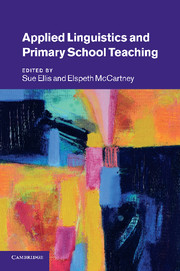Book contents
- Frontmatter
- Contents
- List of figures
- List of tables
- Notes on contributors
- Preface
- Editors' notes and conventions
- Introduction
- Part I Policy and diversity in the twenty-first-century primary school
- Part II The range and focus of applied linguistics research
- Part III Empowering teachers and teachers' use of knowledge
- Introduction to Part III
- 15 Building knowledge about language into a primary teacher education course
- 16 Using the International Phonetic Alphabet to support accurate phonics teaching
- 17 Developing word-level literacy skills in children with and without typical communication skills
- 18 The development of the Speech, Language and Communication Framework (SLCF)
- 19 How to empower teachers working with children with language impairments: why a ‘just-in-time’ model might work
- 20 Communication impairment in a multilingual context
- 21 Teacher education and applied linguistics: what needs to be understood about what, how and where beginning teachers learn
- References
- Index
16 - Using the International Phonetic Alphabet to support accurate phonics teaching
Published online by Cambridge University Press: 26 April 2011
- Frontmatter
- Contents
- List of figures
- List of tables
- Notes on contributors
- Preface
- Editors' notes and conventions
- Introduction
- Part I Policy and diversity in the twenty-first-century primary school
- Part II The range and focus of applied linguistics research
- Part III Empowering teachers and teachers' use of knowledge
- Introduction to Part III
- 15 Building knowledge about language into a primary teacher education course
- 16 Using the International Phonetic Alphabet to support accurate phonics teaching
- 17 Developing word-level literacy skills in children with and without typical communication skills
- 18 The development of the Speech, Language and Communication Framework (SLCF)
- 19 How to empower teachers working with children with language impairments: why a ‘just-in-time’ model might work
- 20 Communication impairment in a multilingual context
- 21 Teacher education and applied linguistics: what needs to be understood about what, how and where beginning teachers learn
- References
- Index
Summary
Introduction
The orthography of English is far from transparent, and how phonemes relate to graphemes is an essential part of teachers' professional knowledge to underpin phonics. This knowledge should be applied from the earliest stages of teaching reading and spelling in order to understand the system and children's confusions, and to give more accurate guidance on where generalisations apply and (just as crucially) where they do not. This chapter argues that teachers need a way of ‘talking about phonemes’ and their relationships with graphemes, and discusses the case for using relevant International Phonetic Alphabet (IPA) symbols as a means of simplifying and systematising teachers' understandings.
To my mind, the aspect of linguistics that is most essential for primary teachers to know is the International Phonetic Alphabet (IPA). To back up this statement, I am going to do the following:
provide some account of previous attempts to define which aspects of linguistics teachers need to know;
summarise the case for using phonics in the initial teaching of reading and spelling;
put the case for teachers needing to know (a bit of) phonetics and IPA to underpin accurate phonics teaching;
answer some objections;
suggest how much teachers might need to know in this area; and
along the way, provide some worked examples of the application of IPA.
Information
- Type
- Chapter
- Information
- Applied Linguistics and Primary School Teaching , pp. 216 - 228Publisher: Cambridge University PressPrint publication year: 2011
Accessibility standard: Unknown
Why this information is here
This section outlines the accessibility features of this content - including support for screen readers, full keyboard navigation and high-contrast display options. This may not be relevant for you.Accessibility Information
- 1
- Cited by
